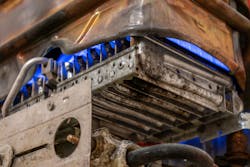Safety Concerns Spark Need for Combustion Analysis
By Ron Johnson
While peak efficiency and ensuring system components are installed and working properly, safety is the primary reason to conduct combustion analysis.
The phrase is a term for assessing a gas appliance—boiler, high efficiency water heaters, and even combination units. The process samples the exhaust gas, or combustion gas, to measure carbon monoxide (CO), carbon dioxide (CO2) and other parts of the combustion makeup. A flame creates byproducts that are released during the combustion process, and analysis determines if you have the best mixture of air and fuel for the appliance.
The danger is the mixture may be incorrect. After installing the appliance, the contractor should measure the combustion process using a combustion analyzer. That will indicate the appliance is achieving safe operation as designed by appliance engineers.
Variables Involved
While most appliances are shipped to the field ready for installation, several variables could affect the combustion process. The most significant factors are flame temperature and the amount of nitrogen in the fuel. Excess air level and combustion air temperature can also impact the process. Most boilers supply between 12 and 15 parts of air for each part of gas.
Efficiency also figures into combustion analysis. Contractors install the appliance based on efficiency and should verify the combustion values to ensure the appliance is at peak operational performance. That will help the home or business owner drive a return on the investment—and ensure product and contractor satisfaction. The return on investment is delivered in cost per BTU if the customer upgrades from a standard efficiency product.
Affecting the Entire System
Combustion analysis also monitors the entire system to maintain peak performance. The boiler is just one component. A thorough analysis will look at the pumps, mixing valves, venting, pipes and other system components. An efficient operating appliance will help protect all components in the system, helping to ensure a long service life.
An important consideration of the process is recognizing where to sample the combustion gases on the unit. Ariston’s test ports on its HTP brand ELU and EFTU models ensure that the contractor is sampling in the exact spot as the company during design and testing phases. The built-in test ports allow the contractor to sample and adjust the unit based on the variables of each job.
The built-in test ports reduce the need for drilling a hole to obtain a sample. The hole is then covered, usually with tape, which over time could develop into a safety concern.
Before Installation
Before the installation process even begins, one other important step is to conduct a site evaluation. The installer should evaluate the hydronic system, evaluating the gas supply (NG or LP), size of gas supply pipe and length and whether the unit had been converted. Venting equipment—intake and exhaust material and size, total straight length and number of fittings, proper pitch and support, concentric and PV or DV—should all be evaluated. Condensate information, domestic water setting and control settings also need inspection.
Combustion analysis is not a new idea, but has become much less costly. In the 1990s, analyzers ranged up to $3,000 and many businesses were reluctant to purchase. Now, appliances have become more sophisticated, but analyzers are easy to obtain and operate. Today’s digital analyzers can be purchased for as little as $400. Attachments and complexity add to the cost, but the cost savings generated by operational efficiency are worth the expense.
Beyond Installation
It is important to note that combustion analysis does not end with installation. Most system owners lack the expertise to perform combustion analysis. All appliances, however, should have a maintenance schedule to check, clean and analyze the unit. That’s a good time for the installer or service technician to ensure that variables have not affected the unit negatively.
If variables have changed, the combustion analysis will confirm and adjustments can usually be made on the gas valve. Digital analyzers make the process simple, and some now include printers that can deliver a copy of the results to the property owner.
Work Smart - Work Safe
Incidents with boilers have decreased considerably in the past century. Accidents in industrial plants and manufacturing facilities were a common occurrence in the early to mid-1900s. Still, accidents with fuel systems happen. There are about 286 natural gas explosions each year in the United States.
It does not require much. A natural gas leak can increase the risk of fire, and an electrical spark near the leak can cause a devastating explosion. That’s exactly what occurred in December in New York, when a faulty boiler connected to a gas line apparently caused an explosion that left six people homeless. In some instances, explosions occur when unskilled and untrained people make improper adjustments to the unit. A properly executed combustion analysis should eliminate the need for any one other than a heating and plumbing professional to adjust the unit.
While somewhat complicated, combustion analysis is a necessary part of every boiler project. Whether it’s a new install at the beginning of the week or a retrofit at the end of the day on Friday, a thorough combustion analysis will not only ensure safety but guarantee efficiency. That will lead to customer satisfaction and, hopefully, a long-term relationship with the client.
Ron Johnson, MBA, PMP, is the National Training Manager for Ariston Thermo in the United States. A graduate of Troy University, Johnson has more than 20 years in Product Management experience and has collaborated with multi-departmental teams for plumbing and HVAC projects to design, develop, implement and evaluate new product introductions to solve market requirements.
